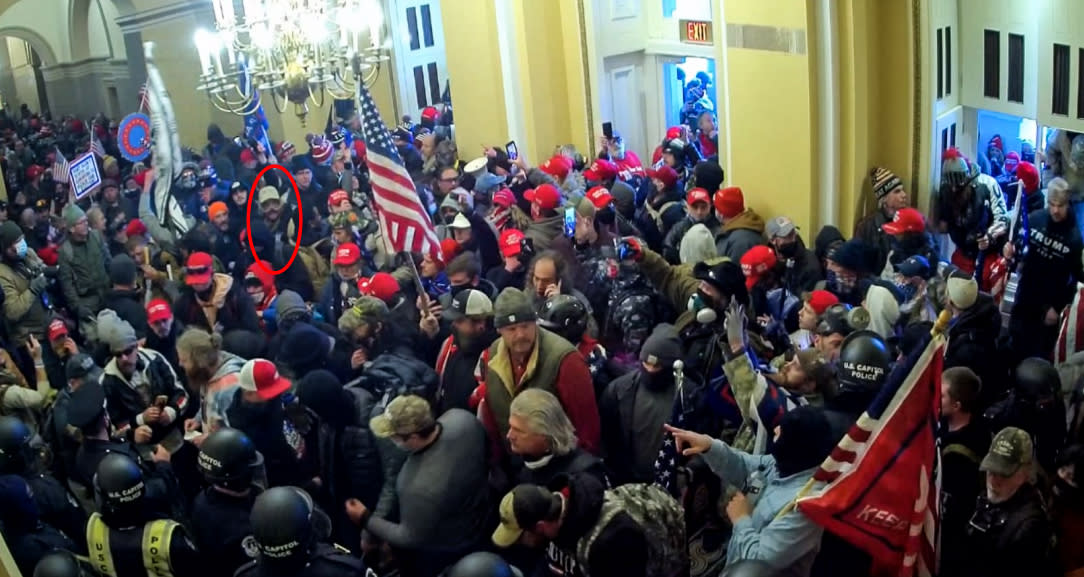Ex-Capitol Police officer charged with obstruction tells jury he is 'embarrassed' by Facebook chat with Jan. 6 rioter
WASHINGTON — A former police officer charged with obstruction for telling a Jan. 6 rioter to remove a Facebook post about being in the U.S. Capitol testified Monday that he was "embarrassed" about having spoken to the man, who he claims duped him about his level of involvement in the attack.
Michael Riley, who sent messages to Jan. 6 rioter Jacob Hiles shortly after the insurrection, when he was a U.S. Capitol Police officer, told jurors Monday that he believed Hiles when Hiles posted that he was forced into the Capitol by the pro-Trump mob.
Riley testified that he regrets having reached out to Hiles “every day” and that it has been “the worst year" of his life. Riley was charged in October 2021 and resigned from the department that month; the details of his departure and his current status have been concealed from jurors.
Under a plea deal with the government, Hiles pleaded guilty to a misdemeanor and was sentenced to two years of probation, along with 60 hours of community service and $500 restitution.
Riley, who fishes in his free time, befriended Hiles, a boat captain with a social media following, shortly before the Capitol attack on Jan. 6, 2021. After another member of the Chesapeake fishing community tagged Riley in Hiles' Facebook post about entering the Capitol, Riley sent a private message telling Hiles to take down the part of his post in which he admitted going into the building. "Just looking out!" Riley wrote in a message in which he said he shared Hiles’ political views. Hiles told the FBI about Riley's messages after he was arrested.
“I was embarrassed, because I had reached out to him in the first place and allowed myself to get in a position like this,” Riley said in court Monday. “I never intended for any of this to happen.”
He later deleted his Facebook messages with Hiles because he was extremely upset, he testified, insisting he wasn't trying to obstruct any investigation.
“I was mad at myself, and I was mad at Jake,” Riley testified. “I was very upset that he was telling the FBI that we were buddies."

The messages might suggest Riley was trying to help Hiles avoid charges, but Riley insisted to the jury that he thought Hiles would be charged if he went into the building regardless of his messages.
Assistant U.S. Attorney Anne P. McNamara asked Riley whether he had wanted Hiles charged.
“If he went into the building, yes,” Riley said. “It’s not that I didn’t want him to be charged,” Riley said — he just didn’t associate him with someone who had broken into the building or injured officers.
McNamara pointed out that Riley could have posted his message to Hiles publicly.
“Why’d you choose to do it privately?” McNamara asked.
“Just because,” Riley replied.
Prosecutors argue that Riley wasn't duped by Hiles and that he crafted the narrative to avoid a conviction. On cross-examination, Riley was pressed about whether Hiles misled him.
"Has every single defendant told you the truth when you spoke to them?" McNamara asked.
"No," Riley replied.
McNamara also highlighted messages that showed Riley referred to Hiles as a "moron" and a "r-----" and said he was "not a bright guy."
"This was the moron you were duped by?" McNamara asked.
"It is," Riley responded.
Riley testified that he believed he has helped arrest more than 1,000 demonstrators over his 25-year career as a Capitol Police officer but that he had never been called to testify before a grand jury and that he couldn't have thought a grand jury would be interested in Hiles' conduct.
He also talked up other aspects of his career, including how he helped sweep the Capitol for bombs as part of his role in the K-9 unit and helped respond to an officer who sustained a head injury on Jan. 6.
Riley testified that he was upset by what happened on Jan. 6, and messages showed that he wanted those who initially breached the Capitol, destroyed property and injured officers to be charged for those crimes.
“It was upsetting to me. I was upset to see our country going through this. We had a lot of officers who were hurt," Riley said.
